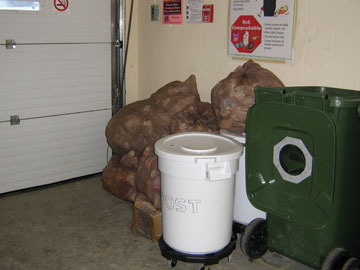A composting program at your workplace can be a great addition to both your workplace sustainability and your personal waste reduction efforts. Composting offers many benefits to both your workplace and the staff that participate.
It is not hard to make composting (along with recycling) a part of the way you do business. If your workplace produces a significant amount of organic waste, including composting in your waste management strategy could provide financial benefits as well as “greening” your operations.
There are several ways that workplaces can participate in composting. The best choice for your workplace will depend on:
- the amount and type of organic waste generated
- the amount of space you have available for on-site composting
- the amount of effort your workplace is willing to dedicate to maintaining the composting system
- the amount of money you are willing to spend on composting facilities (and it does not have to be costly)
- annual fluctuations in your organic waste stream, if there are any.
Downtown offices or workplaces that produce smaller volumes of compostable organics, could chose to choose to have vermicomposting while others might set up outdoor bins on the property. Partnering with organizations interested in composting such as community gardens can also be an option. Larger producers of organics could also consider commercial compositing services that pick-up the materials and compost them off site. These services can vary depending on the area in which you are located.
Vermicomposting
Vermicomposting with Red Wrigglers worms is a great way for smaller workplaces to take up composting. The resulting compost is very rich and can be used for a multitude of uses. Here are a few things you should know when considering vermicomposting:
- Vermicomposting allows for smaller volumes of organics to be composted in an easy and contained manner.
- Red Wrigglers worms are vegetarians and enjoy eating fruit, vegetable scraps, peels, cores, plain breads or pasta, coffee grounds, tea bags, and even ground up egg shells.
- Vermicompost bins do require some basic upkeep: worms have to be fed on a regular basis and have their habitat checked for moisture levels. In addition the work castings have to be removed every so often.
- A properly maintained bin will be relatively odour-free, as long as the worms are not overfed.
- Vermicompost bins may not be able to take all of a workplace’s food waste. Extra waste can be frozen but must be thawed before it is placed in the bin.
- Alternatively, people can be encouraged to take their extra organics home to compost in their own backyard systems.
Outdoor Composting
Outdoor compost bins can take a higher volume of organics than vermicomposting, however it takes a little more organization. It does however mean that a higher percentage of organic waste can be diverted from landfill and made into compost. Here are a few things you need to consider when choosing an outdoor composting system:
- It is important to identify a source of “brown” materials such as dried leaves to to cover the greens, or organic materials that you add to your pile. Both types of materials are necessary for successful composting.
- Individuals need to be identified to take responsibility for adding the organics and brown materials to the pile.
- To be effective, the moisture level in the pile needs to be monitored and the materials aerated or turned from time to time.
- Outdoor composting can allow the whole workplace to be involved.
- Grass clipping and other “green” garden waste can also be composted outdoors.
- The finished compost can be used in planters, gardens, spread on grass areas, or offered to employees for their home use.
- There are lots of compost bin options that your workplace can either build or purchase.
- You can compost all winter!
Community and commercial options
If your workplace is not able to undertake composting on site, there are still options:
- Try contacting a local community garden to see if they’d like to partner with you and compost your organics on their site. They might be more than willing to consider this, because finished compost is a great soil amendment that plants and gardeners love!
- Try finding a local composter who might be wlling to pick-up your organics and compost them. This may be a useful option for businesses that have larger volumes of material and/or where on-site composting is impactical. (downtown etc.)
- Check with employees who compost at home and that might be willing to take organics from work to their home composting bins. Avid gardeners can’t ever seem to get enough compost.
- Consider commercial composting services if available.
Composting the organics produced at your workplace is a great way for your company to demonstrate its commitment to the environment. For more on how to get started, check out our composting program information.
Need Help?
Green Action Centre offers presentations and courses, printed materials, and support for all your composting needs. If you have questions:
- Give us a call: toll free at 1-866-394-8880 or in Winnipeg at 925-3777
- Drop us an [email text=”email”]compost@greenactioncentre.ca[/email].




Recent Comments